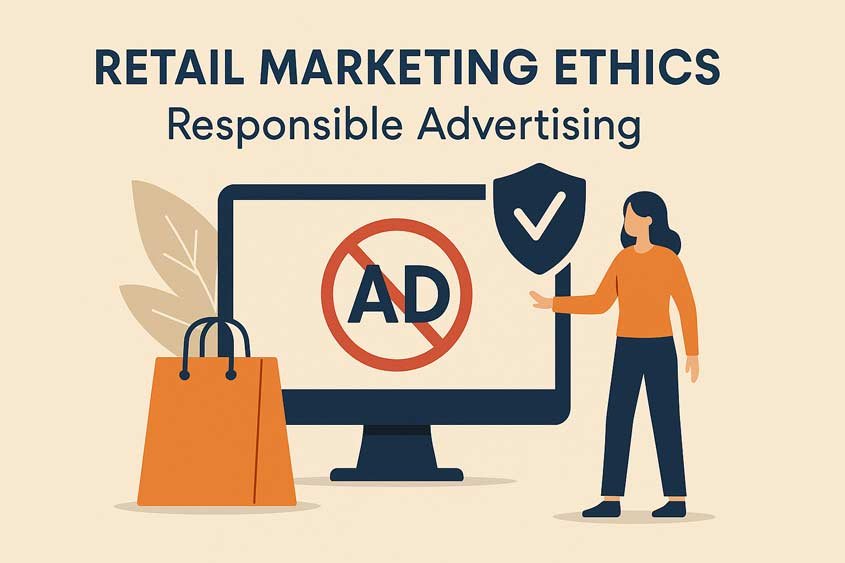Understanding Retail Marketing Ethics
Retail marketing ethics isn’t just a buzzword—it’s the backbone of how businesses build lasting relationships with customers. In a world where consumers are constantly bombarded with advertisements, ethical practices separate trusted brands from those that fade into obscurity. Ethical retail marketing ensures that messaging, promotions, and campaigns are truthful, transparent, and considerate, respecting both the audience and societal norms.
Consider a scenario: a new retail brand launches a “limited-time offer” claiming extreme discounts on high-demand products. Social media posts paint a picture of scarcity, but in reality, stock levels are ample and prices have been inflated beforehand to make the discounts seem larger. Consumers quickly notice the discrepancy, share their frustration online, and the brand faces negative press. This isn’t just a PR headache—it’s a breach of trust. Once trust erodes, customer loyalty plummets, and recovering reputation can take years, even with expensive advertising campaigns.
Table of Contents
Ethics in retail marketing goes beyond avoiding blatant lies. It touches on the subtle ways brands influence consumer behavior, the fairness of promotions, the transparency of pricing, and even how data is collected and used. With the rise of digital tools, algorithms, and AI-driven campaigns, the boundaries of ethical marketing have become both more complex and more critical. Today’s consumers expect brands not only to provide quality products but also to communicate honestly, respect privacy, and align with broader social values.
Brands that embrace retail marketing ethics gain more than just compliance; they earn credibility, foster loyalty, and differentiate themselves in competitive markets. Ethical campaigns often resonate more deeply with audiences because they feel authentic and considerate, unlike manipulative or deceptive advertisements. Marketing teams now face the challenge of balancing persuasive messaging with integrity, ensuring that campaigns inspire rather than mislead.
Ultimately, responsible advertising isn’t about limiting creativity or slowing down marketing efforts—it’s about channeling that creativity into campaigns that reflect honesty, fairness, and accountability. Retailers who understand this can leverage ethics as a strategic advantage, cultivating a customer base that not only buys but also trusts, advocates, and returns. In the sections that follow, we will explore the core principles, legal frameworks, digital challenges, case studies, and practical strategies that define ethical retail marketing today.
The Principles of Ethical Retail Marketing
Ethical retail marketing is grounded in principles that guide how brands communicate, promote, and interact with customers. These principles ensure that businesses operate with integrity, build trust, and avoid practices that could harm consumers or the brand itself. While marketing inherently aims to persuade, the key lies in balancing persuasion with responsibility.
Transparency in Advertising
Transparency is the cornerstone of ethical retail marketing. It requires that all promotional content—whether online, in-store, or via email—accurately represents the product or service. Misleading claims, exaggerated discounts, or hidden terms can erode trust quickly.
For instance, a retailer advertising a “50% off” sale must ensure that the discount is genuine and applies to a substantial portion of the product range. If only a few items are discounted, or prices were raised beforehand to make the discount appear larger, customers feel deceived. Transparency also extends to labeling, product descriptions, and claims about features or benefits. Detailed, honest information allows consumers to make informed purchasing decisions, reducing frustration and complaints.
Fairness in Targeting Audiences
Ethical retail marketing also involves fairness in audience targeting. Brands must avoid exploiting vulnerable groups such as children, the elderly, or financially sensitive consumers. Manipulative tactics—like creating artificial urgency or pressuring through excessive retargeting—can cross ethical boundaries.
Responsible marketers consider not only the effectiveness of a campaign but also its social impact. For example, when promoting dietary supplements or luxury items, campaigns should avoid implying unrealistic results or emotional pressure. Fairness also applies to diversity and inclusivity, ensuring campaigns do not perpetuate stereotypes or discriminate against specific groups.
Accountability and Brand Responsibility
Accountability requires that brands acknowledge the impact of their marketing actions and take responsibility for any negative outcomes. This includes mistakes, miscommunications, or campaigns that unintentionally cause harm. Ethical brands proactively set internal policies, monitor compliance, and ensure their marketing teams understand the consequences of unethical practices.
Key steps to enforce accountability include:
- Establishing ethical marketing guidelines for all campaigns
- Conducting regular audits to ensure messaging aligns with company values
- Training employees on ethical decision-making in promotions and advertisements
Accountability also strengthens the connection between marketing and corporate values. When consumers perceive a brand as responsible, they are more likely to remain loyal, even when occasional mistakes occur. Ethical behavior becomes a differentiator, enhancing reputation and long-term profitability.
Retail marketing ethics isn’t just about avoiding lawsuits or negative press—it’s about fostering genuine trust. Transparent communication, fair treatment of audiences, and accountable practices create a foundation for campaigns that are not only effective but also respected. Ethical principles guide brands to deliver messages that inform, engage, and persuade without compromising integrity.
Legal and Regulatory Considerations
Retail marketing operates within a complex legal landscape designed to protect consumers and maintain fair competition. Understanding these laws is crucial for ethical marketing, as failure to comply can lead to fines, lawsuits, and irreparable damage to a brand’s reputation. Legal and regulatory considerations form a backbone for responsible advertising, ensuring that marketing campaigns remain truthful, fair, and respectful of consumer rights.
Key Laws Impacting Retail Marketing
Several laws and regulations directly influence how retailers can advertise products and services. Consumer protection laws, such as the Federal Trade Commission (FTC) guidelines in the United States or the Consumer Protection Act in the European Union, mandate that marketing must be truthful, non-deceptive, and substantiated. This includes claims about product performance, pricing, and promotional offers.
Data privacy laws, such as the General Data Protection Regulation (GDPR) in Europe and the California Consumer Privacy Act (CCPA) in the U.S., regulate how marketers can collect, store, and use customer information. Noncompliance can result in hefty fines and lost consumer trust. Marketers must also consider advertising standards that dictate permissible content, prohibiting offensive, misleading, or discriminatory messaging.
Avoiding Deceptive Practices
Deceptive marketing can take many forms—from false product claims to hidden fees or manipulative urgency tactics. Examples include:
- Advertising a “free” service that requires hidden purchases
- Inflated product reviews or endorsements
- Exaggerated scarcity claims to pressure consumers into buying
Avoiding these practices requires diligence and internal checks. Ethical marketing involves verifying every claim, providing clear terms and conditions, and presenting promotions honestly. Transparency in contract terms, refund policies, and pricing ensures consumers are fully informed before purchasing.
Compliance Strategies
Retailers can implement several strategies to ensure legal compliance and uphold ethical standards:
- Conduct regular audits of marketing materials to identify misleading content
- Establish an internal review team or partner with legal advisors to vet campaigns
- Provide training sessions for marketing teams on relevant laws and ethical practices
- Maintain documentation for claims and promotions to substantiate advertising messages
Compliance is not just a legal obligation—it is a competitive advantage. Consumers are increasingly aware of their rights, and brands that demonstrate adherence to legal and ethical standards gain trust, loyalty, and positive brand perception. Ethical marketing and legal compliance go hand in hand, ensuring campaigns are effective, responsible, and sustainable.
By integrating regulatory knowledge with ethical principles, retailers can design campaigns that are persuasive yet fair, balancing marketing goals with accountability and respect for consumer rights.
Ethical Challenges in Digital Marketing
The digital era has transformed retail marketing, opening unprecedented opportunities for engagement while introducing new ethical challenges. Social media, targeted advertising, and AI-driven tools allow marketers to reach audiences with precision, but these capabilities also raise questions about fairness, privacy, and transparency. Retail marketing ethics in the digital space requires careful navigation to maintain trust and protect consumers.
Social Media Advertising Pitfalls
Social media platforms offer enormous reach and creative freedom, but ethical dilemmas frequently arise. Influencer marketing, sponsored content, and algorithmic promotions can blur the line between genuine recommendations and paid endorsements. Ethical marketers ensure that all sponsored posts are clearly disclosed and that influencers genuinely align with the brand’s values.
Overly aggressive retargeting campaigns are another area of concern. While personalized ads can improve conversion rates, bombarding consumers with repetitive messages can feel manipulative. Brands need to strike a balance between effective targeting and respecting user experience. Ethical approaches include frequency capping, clear opt-out options, and avoiding deceptive content that exaggerates product benefits.
Data Collection and Privacy
Digital marketing relies heavily on consumer data, but ethical usage is critical. Collecting personal information without consent, tracking behavior across sites, or sharing data with third parties without transparency violates both legal standards and ethical norms.
Best practices for ethical data use include:
- Obtaining explicit consent for data collection and clearly explaining its purpose
- Anonymizing or aggregating data to minimize privacy risks
- Allowing consumers to access, modify, or delete their information
Retailers that respect data privacy foster trust. When consumers know their information is protected and used responsibly, they are more likely to engage with personalized offers and loyalty programs.
Algorithmic Bias and AI in Marketing
Artificial intelligence and automation increasingly influence marketing decisions, from product recommendations to dynamic pricing. While these tools improve efficiency, they can unintentionally perpetuate biases. For example, an AI model trained on historical purchase data might underrepresent certain demographics, limiting the reach of promotions or unfairly targeting others.
Ethical marketers must audit AI systems regularly, ensuring that algorithms are transparent, fair, and accountable. Strategies include reviewing training data for bias, testing outputs for fairness, and providing mechanisms to correct errors. Integrating human oversight with AI-driven campaigns ensures that automation enhances marketing effectiveness without compromising ethical standards.
Navigating these digital challenges requires constant vigilance. Retailers that prioritize transparency, respect privacy, and actively monitor algorithmic fairness can leverage digital tools responsibly, building campaigns that are both effective and ethically sound. Ethical digital marketing strengthens brand credibility, minimizes regulatory risk, and enhances consumer relationships in an increasingly online world.
Case Studies: Brands That Got It Right (and Wrong)
Learning from real-world examples helps retailers understand how ethical decisions impact marketing success. Examining brands that executed campaigns responsibly—and those that failed—highlights practical lessons for implementing retail marketing ethics effectively.
Successful Ethical Campaigns
Some brands have built reputation and customer loyalty by prioritizing ethical marketing principles.
1. Patagonia’s Environmental Campaigns
Patagonia has consistently aligned its marketing with sustainability and social responsibility. Campaigns highlighting environmentally friendly products and encouraging conscious consumer behavior reflect transparency and accountability. By being honest about production methods and environmental impact, Patagonia has strengthened brand trust and loyalty, proving that ethical marketing can also drive sales.
2. Dove’s Real Beauty Initiative
Dove avoided traditional beauty stereotypes by featuring diverse, unretouched images in its campaigns. The focus on authenticity resonated with audiences worldwide, promoting inclusivity and social awareness. Dove’s marketing reinforced ethical principles, demonstrating fairness and respect for the audience while successfully differentiating the brand.
3. LEGO’s Responsible Advertising to Children
LEGO has committed to ethical marketing targeted at children by avoiding manipulative tactics and clearly communicating product value. Campaigns are transparent, age-appropriate, and educational, establishing the brand as trustworthy and socially responsible.
Lessons from Missteps
Even established brands can falter when ethical considerations are ignored.
1. Volkswagen’s Emissions Scandal Advertising
Volkswagen marketed “clean diesel” vehicles as environmentally friendly, despite knowing about emissions cheating. The deception not only violated legal standards but also caused immense reputational damage, massive fines, and a loss of consumer trust.
2. Pepsi’s Controversial Campaign with Kendall Jenner
Pepsi released an ad attempting to link a protest with its product. The campaign trivialized social issues and was widely criticized for insensitivity. The backlash demonstrated how ignoring ethical and cultural considerations in marketing can alienate audiences and harm brand perception.
3. Facebook Data Privacy Concerns
Although not a traditional retail brand, Facebook’s misuse of user data illustrates the ethical pitfalls of digital marketing. Mismanagement of personal information led to regulatory scrutiny and consumer distrust, emphasizing the importance of transparency and data responsibility.
Key Takeaways for Retailers
- Clear Communication: Ensure all claims, promotions, and messaging are accurate and verifiable.
- Respect for Privacy: Use customer data responsibly, with consent and transparency.
- Social Responsibility: Consider the societal impact of campaigns, avoiding exploitation or misrepresentation.
- Continuous Evaluation: Monitor campaigns for ethical alignment and address issues proactively.
Case studies demonstrate that ethical marketing is not just theoretical—it has tangible consequences. Brands that prioritize honesty, fairness, and social responsibility strengthen loyalty, mitigate risk, and often achieve long-term business success. Conversely, ignoring ethics can trigger backlash, regulatory penalties, and lasting reputational harm. Retailers can leverage these examples to design campaigns that are persuasive, responsible, and aligned with modern consumer expectations.
Implementing a Retail Marketing Ethics Framework
Creating a formal framework for retail marketing ethics ensures that responsible practices are embedded into every campaign and decision. It moves ethical principles from abstract ideals into actionable, measurable policies, helping brands maintain consistency, transparency, and accountability.
Developing Internal Guidelines
The first step in implementing a framework is establishing clear internal guidelines. These should cover advertising standards, promotional practices, digital marketing behavior, and audience targeting rules. Guidelines can include:
- Rules for truthful product descriptions and transparent pricing
- Restrictions on targeting vulnerable groups with manipulative messaging
- Policies for influencer partnerships, including disclosure requirements
A written code of ethics provides a reference point for all marketing activities. It ensures that new campaigns are evaluated against consistent criteria and helps align team members with the company’s values.
Training and Awareness
Policies alone are not enough. Marketing teams must be trained to recognize ethical dilemmas and make informed decisions. Training programs can include scenario-based exercises, workshops on transparency and fairness, and discussions of past case studies.
For example, employees can review sample campaigns and identify areas where messaging could be misleading or manipulative. This hands-on approach not only reinforces understanding of the guidelines but also fosters a culture of ethical decision-making. Ongoing education is vital as marketing tools, platforms, and consumer expectations evolve rapidly.
Monitoring and Continuous Improvement
An effective ethics framework includes mechanisms for monitoring campaigns and improving practices over time. Regular audits of marketing materials help identify potential risks before they escalate. Metrics can track adherence to ethical standards, customer feedback, and social media sentiment.
Key components of continuous improvement include:
- Establishing feedback loops from consumers and employees
- Reviewing campaigns post-launch to assess ethical compliance
- Adjusting guidelines based on new regulations, technologies, and industry trends
Monitoring also ensures accountability. When marketers know that campaigns will be reviewed against ethical benchmarks, they are more likely to maintain high standards. Continuous improvement makes ethics a dynamic, integral part of the marketing process rather than a static checklist.
Implementing a retail marketing ethics framework benefits both consumers and brands. It strengthens trust, minimizes legal and reputational risks, and enhances overall campaign effectiveness. By integrating guidelines, training, and monitoring, retailers can ensure that ethics is consistently applied across all marketing efforts, reinforcing brand credibility and long-term success.
Building Trust Through Responsible Advertising
Ethical retail marketing is more than a compliance requirement—it is a strategic imperative. Responsible advertising builds trust, strengthens customer loyalty, and differentiates brands in an increasingly competitive market. When campaigns prioritize transparency, fairness, and accountability, consumers feel respected, informed, and confident in their purchasing decisions.
Retailers that embrace ethical marketing practices demonstrate integrity in every interaction. Transparent product descriptions, honest promotions, and respectful targeting signal that a brand values its customers beyond immediate sales. This approach encourages repeat business, positive word-of-mouth, and long-term brand equity. Consumers today are more informed and socially conscious, actively rewarding brands that align with ethical principles while holding accountable those that fall short.
Digital marketing adds complexity, but it also offers tools to reinforce ethics. Proper data management, responsible use of AI, and clear disclosure of sponsored content ensure campaigns are both effective and principled. Retailers who monitor, train, and refine their practices continuously can mitigate risks and respond to evolving ethical challenges.
Building a framework for ethical marketing embeds these practices into daily operations. Internal guidelines, staff training, and ongoing audits create a culture of responsibility. When every campaign is evaluated against these standards, ethical decision-making becomes second nature, supporting both compliance and competitive advantage.
Ultimately, retail marketing ethics is about aligning persuasion with principle. Brands that invest in responsible advertising cultivate trust, loyalty, and credibility that cannot be bought. By prioritizing ethics in every campaign, retailers can foster meaningful connections with customers, ensure sustainable growth, and make marketing a force for positive impact.

Gabi is the founder and CEO of Adurbs Networks, a digital marketing company he started in 2016 after years of building web projects.
Beginning as a web designer, he quickly expanded into full-spectrum digital marketing, working on email marketing, SEO, social media, PPC, and affiliate marketing.
Known for a practical, no-fluff approach, Gabi is an expert in PPC Advertising and Amazon Sponsored Ads, helping brands refine campaigns, boost ROI, and stay competitive. He’s also managed affiliate programs from both sides, giving him deep insight into performance marketing.


